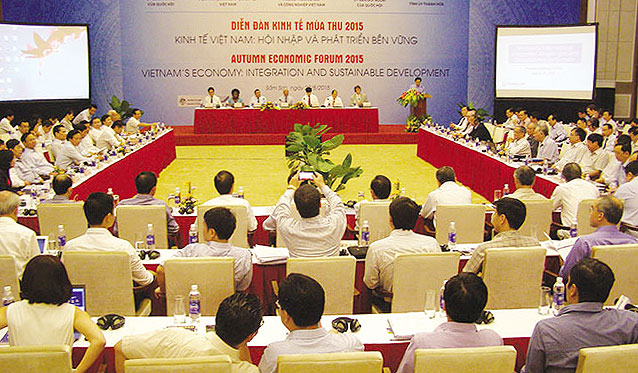Integration requires enhanced reform

Experts gathered at the Autumn Economic Forum 2015 to discuss Vietnam’s future on the global market
The message was made by many experts at last week’s Autumn Economic Forum 2015 held by the National Assembly’s Economic Committee and the Vietnam Chamber of Commerce and Industry in Thanh Hoa province.
Vietnam’s active international integration, clearly mirrored by import-export reports and foreign investment activities has rapidly fostered local economic growth of 6.5 per cent on average during the 2001-2012 period, and gross domestic product (GDP) per capita of $2,0521 last year.
According to the World Bank data, Vietnam’s trade to GDP ratio reached 164 per cent in 2013, among the highest in ASEAN. Since 2000, the country’s manufacturing exports has sharply increased, at an average annual rate of 23 per cent in nominal terms, reaching $94.6 billion in 2013.
“Vietnam has been one of the most active participants in the global economic integration process in the last two decades,” said Australian Ambassador to Vietnam Hugh Borrowman at the forum.
“This transformation is borne out in some impressive statistics. For example, the volume of Vietnam’s international merchandise trade has increased more than four times, from $69.2 billion to $298.2 billion between 2005 and 2014,” Borrowman said.
He added that stronger integration will create greater opportunities for Vietnam, but at the same time come challenges in terms of competiveness and structural reform. “One way to do this is to conduct reform measures that will make Vietnam’s economy and firms more competitive in order to win market share abroad and attract necessary investment to upgrade the economy and achieve its growth potential,” Borrowman commented.
Other participants shared the view that Vietnam ought to enhance its institutional reform and the competitiveness of local businesses.
The country’s infrastructure and human resources, according to experts, are also insufficient and not yet up to international integration requirements.
In particular, manufacturing technologies have not been upgraded, nor has technology transfer received due attention. Additionally, enterprises’ management and administration have not caught up to the competitive requirements of an ever-increasingly fierce market. Likewise, institutional reform, in terms of mechanisms and policies, has not picked up its pace in response to the country’s swift integration.
“We need institutions that support businesses to grow in the right direction, in line with international standards,” suggested Tran Du Lich, a member of the National Assembly Economic Committee.
Economist Le Dang Doanh said that “while overseeing the integration opportunities, if we don’t reform or restructure in a timely manner, international integration may well be a double-edged sword. Not everyone will win, some may lose out, and what we need to do right now is winning the game of integration.”
Economist Vo Dai Luoc stressed that the whole economy’s competitiveness had not kept up with such broad integration. “The entire country will encounter global competitiveness rather than the state itself. As such, if the institutions and administration have any problems, local businesses will not be able to do anything”.
National Assembly Vice Chairman Uong Chu Luu also stressed that attention on education and training was essential to meet Vietnam’s development demand.
What the stars mean:
★ Poor ★ ★ Promising ★★★ Good ★★★★ Very good ★★★★★ Exceptional
Latest News
More News
- Foreign leaders extend congratulations to Party General Secretary To Lam (January 25, 2026 | 10:01)
- 14th National Party Congress wraps up with success (January 25, 2026 | 09:49)
- Congratulations from VFF Central Committee's int’l partners to 14th National Party Congress (January 25, 2026 | 09:46)
- 14th Party Central Committee unanimously elects To Lam as General Secretary (January 23, 2026 | 16:22)
- Worldwide congratulations underscore confidence in Vietnam’s 14th Party Congress (January 23, 2026 | 09:02)
- Political parties, organisations, int’l friends send congratulations to 14th National Party Congress (January 22, 2026 | 09:33)
- Press release on second working day of 14th National Party Congress (January 22, 2026 | 09:19)
- 14th National Party Congress: Japanese media highlight Vietnam’s growth targets (January 21, 2026 | 09:46)
- 14th National Party Congress: Driving force for Vietnam to continue renewal, innovation, breakthroughs (January 21, 2026 | 09:42)
- Vietnam remains spiritual support for progressive forces: Colombian party leader (January 21, 2026 | 08:00)
















 Mobile Version
Mobile Version